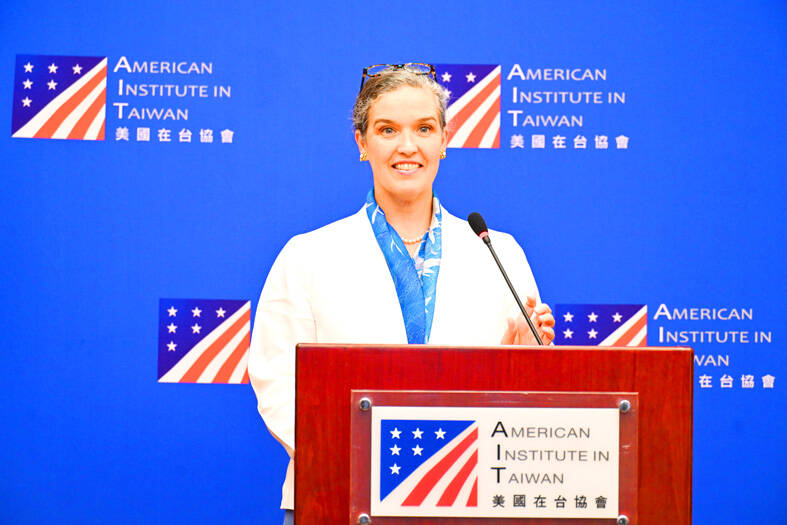The US is “confident” that Taiwan does not face an imminent threat of a Chinese invasion, American Institute in Taiwan (AIT) Director Sandra Oudkirk told a US public radio show, adding that Washington remains committed to defensively arming the nation.
She made the comment during an interview on All Things Considered, broadcast on Friday on US-based National Public Radio.
“There is an important distinction between making plans and training troops, and getting ready to do something,” Oudkirk said, on whether she thinks Beijing plans to attack Taiwan in the near future.

Photo: Tien Yu-hua, Taipei Times
Chinese officials have told Washington that “their preference is for peaceful reunification, and the United States is confident that there is no imminent threat of invasion for Taiwan,” she added.
Last month, US President Joe Biden met Chinese President Xi Jinping (習近平) on the sidelines of the APEC summit in San Francisco, where they discussed the security situation in the Taiwan Strait.
The White House said that Biden called on China to exercise restraint regarding military activity in and around Taiwan, while Reuters reported that Xi demanded that the US stop sending weapons to Taiwan and support Beijing’s plans to annex it.
On whether Washington would halt weapons sales to Taipei at Xi’s request, Oudkirk said that selling Taiwan defensive weapons is part of the US’ long-standing “one China” policy, which has bipartisan support among US lawmakers and remains unchanged.
“Part of that approach to Taiwan is the agreement that the United States will sell defensive weapons to Taiwan, sort of linked to the level of threat that Taiwan faces,” she said. “So that’s a commitment that the United States has made, and that isn’t going to change.”
A recent survey titled, “American Portrait,” conducted by Academia Sinica’s Institute of European and American Studies, showed that only 34 percent of Taiwanese believe the US is a trustworthy country, a drop of 11 percentage points from 2011.
Regarding how the US can counter disinformation and false claims spread online about the US, and people in Taiwan who say that Washington is an unreliable partner, Oudkirk said that the US should be talking more.
“The way to push back against disinformation and sort of deliberate information manipulation is to talk and to engage and to be approachable, and also to work on things like media literacy,” she said.

INVESTIGATION: The case is the latest instance of a DPP figure being implicated in an espionage network accused of allegedly leaking information to Chinese intelligence Democratic Progressive Party (DPP) member Ho Jen-chieh (何仁傑) was detained and held incommunicado yesterday on suspicion of spying for China during his tenure as assistant to then-minister of foreign affairs Joseph Wu (吳釗燮). The Taipei District Prosecutors’ Office said Ho was implicated during its investigation into alleged spying activities by former Presidential Office consultant Wu Shang-yu (吳尚雨). Prosecutors said there is reason to believe Ho breached the National Security Act (國家安全法) by leaking classified Ministry of Foreign Affairs information to Chinese intelligence. Following interrogation, prosecutors petitioned the Taipei District Court to detain Ho, citing concerns over potential collusion or tampering of evidence. The

Seventy percent of middle and elementary schools now conduct English classes entirely in English, the Ministry of Education said, as it encourages schools nationwide to adopt this practice Minister of Education (MOE) Cheng Ying-yao (鄭英耀) is scheduled to present a report on the government’s bilingual education policy to the Legislative Yuan’s Education and Culture Committee today. The report would outline strategies aimed at expanding access to education, reducing regional disparities and improving talent cultivation. Implementation of bilingual education policies has varied across local governments, occasionally drawing public criticism. For example, some schools have required teachers of non-English subjects to pass English proficiency

NEGOTIATIONS: The US response to the countermeasures and plans Taiwan presented has been positive, including boosting procurement and investment, the president said Taiwan is included in the first group for trade negotiations with the US, President William Lai (賴清德) said yesterday, as he seeks to shield Taiwanese exporters from a 32 percent tariff. In Washington, US Trade Representative Jamieson Greer said in an interview on Fox News on Thursday that he would speak to his Taiwanese and Israeli counterparts yesterday about tariffs after holding a long discussion with the Vietnamese earlier. US President Donald Trump on Wednesday postponed punishing levies on multiple trade partners, including Taiwan, for three months after trillions of US dollars were wiped off global markets. He has maintained a 10 percent

TRADE: The premier pledged safeguards on ‘Made in Taiwan’ labeling, anti-dumping measures and stricter export controls to strengthen its position in trade talks Products labeled “made in Taiwan” must be genuinely made in Taiwan, Premier Cho Jung-tai (卓榮泰) said yesterday, vowing to enforce strict safeguards against “origin laundering” and initiate anti-dumping investigations to prevent China dumping its products in Taiwan. Cho made the remarks in a discussion session with representatives from industries in Kaohsiung. In response to the US government’s recent announcement of “reciprocal” tariffs on its trading partners, President William Lai (賴清德) and Cho last week began a series of consultations with industry leaders nationwide to gather feedback and address concerns. Taiwanese and US officials held a videoconference on Friday evening to discuss the